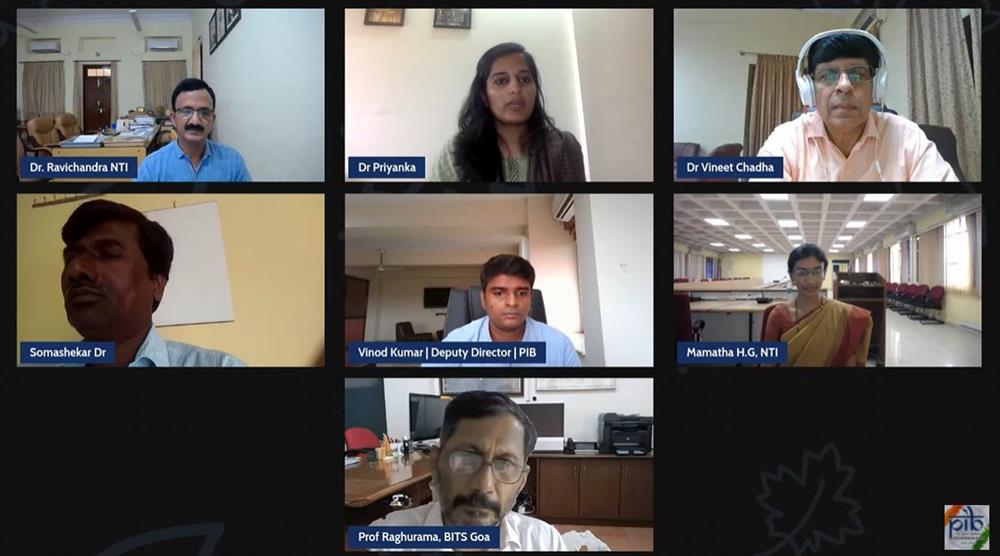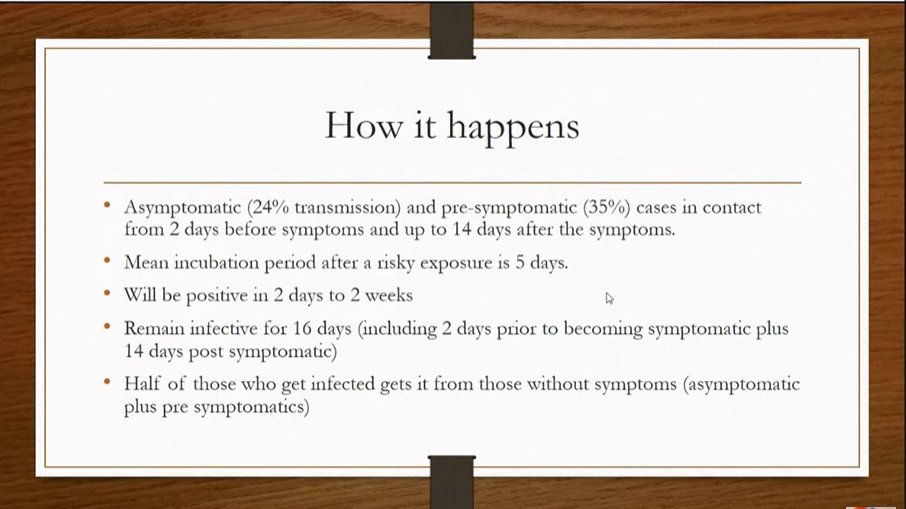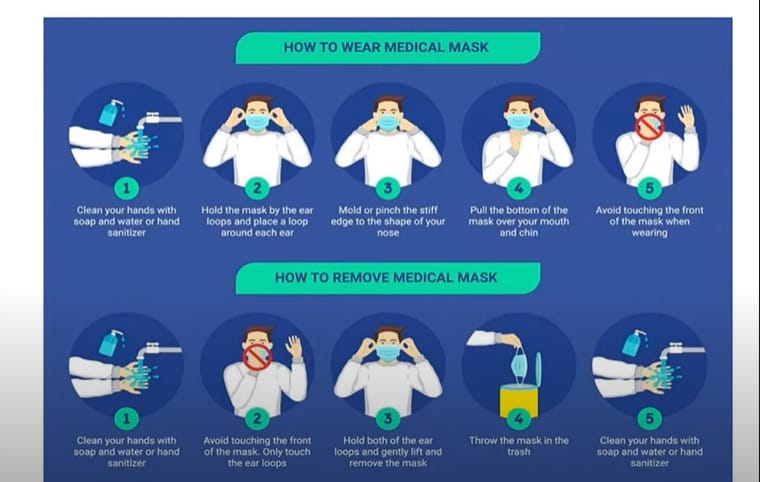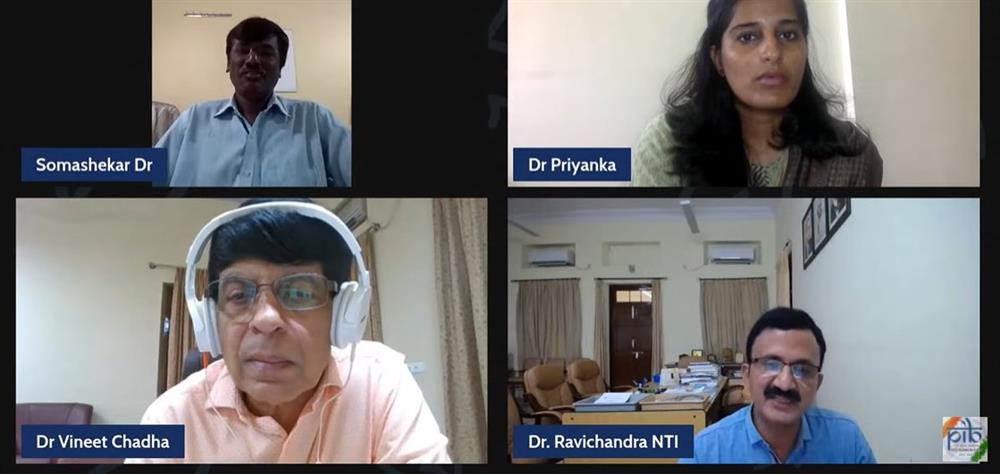Ministry of Health and Family Welfare
India Fights COVID-19 Webinar explores what to do after Positive Test Result
Posted On:
06 MAY 2021 4:10PM by PIB Mumbai
As the second wave of COVID-19 is driving more and more people into distress, lack of authentic information has added to the wave of infodemic. Lack of reliable information creates panic. In an effort to address these issues, Press Information Bureau organized a webinar titled ‘So you become COVID Positive, What's Next?’ in collaboration with National Tuberculosis Institute, Bangalore and Birla Institute of Technology, Goa, today.

Expert panel of speakers who participated in the webinar includes Dr. Somashekhara, Director, NTI, Dr. Vineet Kumar Chadha, Advisor, NTI, Dr. C. Ravichandra, CMO-NFSG, Head of Training Division, NTI, Dr. Mamatha H.G, Consultant Microbiologist, NTI, Prof. Raghurama, BITS, Goa.

So you become COVID Positive, What's Next?
Prof. Raghurama, BITS, Goa spoke about how important it is for everyone of us to follow COVID appropriate behaviour to end the pandemic. “I think there is a greater responsibility on COVID patients too. Doctors say, 80% of the efforts has to be from the patients. If a patient does not follow COVID-19 protocols or instructions given by Doctors, instead panics and adds stress to oneself then the treatment or recovery will be more difficult,” said Prof. Raghuram.
He went on to say that following COVID Appropriate Behaviour is equal to serving the society. “Do not challenge the administration. Stay home and do not go outside unless absolutely necessary. It is one of the social services which we can do during this time,” he added.
Citing the significance for public to act on correct information and guidance, Dr. Somashekar pointed out that there is a requirement to keep updating with authentic information around us. “Official public health guidelines are evolving. What is correct today may not be applicable tomorrow,” he stated.
Dr. Ravichandra, CMO, NIT spoke in detail about how one gets infected with COVID-19, onset of symptoms, clinically approved treatment methods and precautions to be taken post COVID.
“24% of infections are transmitted via patients who don't develop symptoms whereas patients who are yet to develop symptoms transmit 35% of COVID infection. We have to be very careful up to 14 days after appearance of COVID-19 symptoms since infection can spread till then”, he cautioned.
Speaking about the panic created all over with this second COVID wave, he said that more than 98% of cases are cured by following proper medication and treatment as advised by the Doctors. He also said that there is a pressing need to adhere to the advice of the physician.
“80% of COVID-19 cases reported are mild. Just isolate yourself. Only 15% COVID patients may have moderate disease where one’s oxygen saturation level may go less than 94%. And the remaining 5% COVID infected people may end up having severe disease which shows respiratory rate higher than 30/minute and oxygen saturation level less than 90%.”
He also spoke about various precautionary methods to be adopted by patients with mild, moderate and severe COVID disease.
Speaking about the common treatment methods being adopted in treating severe COVID cases, he elaborated about the usage and impact of Remdesivir, Tocilizumab, Plasma therapy etc. “Many patients will recover without Remdesivir. Also even if used, it should be used only in specific circumstances. Remdesivir should not be used among patients who are not on oxygen support or by those who are in home settings,” Dr. Ravichandra insisted.
“Tocilizumab can be very useful in bringing back patients who are slipping away into critical stage. However it should be used only in those who are on oxygen therapy and also those who don't suffer from known contra indications,” he added.
Dr. Vineet Chadha spoke about how proper use of mask can control the spread of the Pandemic more effectively and how ignoring the significance of masks can harm us. “Most people don't use masks properly. Masks are the most useful weapon in our fight against COVID-19, we need to know how to wear and dispose it properly. Proper use and disposal of masks very important. Avoid touching the front of the mask when wearing” Dr. Vineet said.
He also suggested a few crucial practices to be adopted while using masks. “Better to use separate mask for home and for office. Never place it directly on surfaces. Don't wash N95 mask with soap /detergent and special care to be taken while disposing N95 Mask,” he said.
Mamatha H G, Consultant Microbiologist, National Tuberculosis Institute, highlighted the need for proper disinfection procedure to be adopted at the earliest since medical wastage due to COVID-19 is growing day by day. “Masks, gloves, medical wastes can become major sources of COVID-19 infection transmission if not treated properly and not discarded without proper disinfection procedure,” she said.

The webinar also had a Q&A session
Given below are a few answers given by our expert panel members on COVID-19
1) RT-PCR tests may not yield Positive result in all positive cases, since its sensitivity is 60% - 70%. In such cases, CT-scan which has higher sensitivity may be required. But patients should not request for it. It should be strictly doctor's decision - Dr. Ravichandra, NTI
2) If you get COVID-19 infected after first dose, wait until your results become negative. Take the second dose, 4 weeks after resolution of symptoms.
3) Remember, even after taking Vaccine, you should continue to take precautions. Vaccine helps prevent severe illness and death.
4) If you are yet to take the Vaccine but got COVID +ve, you should delay Vaccination by 3 to 4 weeks.
5) Ideal period of second dose of Vaccine is 8 to 12 weeks. Even if you delay by another 3 to 4 weeks, it is not going to decrease the efficacy of the Vaccine
6) (1) In case of pregnant mothers, there is no clear data on effect of Vaccine on foetus.
6) (2) In case of breastfeeding mothers, better to wean baby into other foods and then vaccinate. But if chances of infection are high, better to vaccinate even if lactating.
7) For those who don't have pulse Oximeter at home:
Keep your palm on your chest, measure your respiratory rate for one minute:
If it is less than 24, it is fine
If more than 24, it is moderate
If more than 30, it may be severe disease
8) High risk patients with pre-existing conditions like heart disease, hypertension, who have only mild COVID-19 disease and are in home isolation, can continue to take existing medications upon consultation with doctor
9) Don't take antibiotics on your own unnecessarily. Take only if prescribed by physician, after clinical examination and assessment of risks. Antibiotics are usually prescribed to take care of secondary infections, as a prophylactic, but not for treatment for COVID-19
10) If cough still persists, weight loss is there, even after recovering from COVID-19, it could be a case of Tuberculosis (TB). So, consult doctor for early diagnosis and necessary action
11) Take care of your mental health too, especially after getting infected with COVID-19. Reduce screen time, take rest, get good sleep, relax.
12) COVID -19 patient becomes non-infectious mostly 10 days after symptom onset. Hence, Negative RT-PCR test after home isolation is not required if patient is not having symptoms and no fever for last few days
13) There is risk of catching COVID infection even in open air even if we are wearing mask, but someone near us is not. That is why everyone needs to observe COVID-19 appropriate behaviours. Only then we can get over this Pandemic
14) Steroids are NOT advised in initial phase of COVID-19 infection. It is advised only if COVID patient is slipping into moderate/severe cases, where there is indication of worsening of inflammatory conditions; Dexamethasone and Methylprednisolone have saved and save many lives, when patients are already on Oxygen support; strictly not advisable to use steroids in initial phase of COVID-19 infection
15) When blood clot happens, it will present as a very dramatic, serious condition, requiring urgent attention. So, clotting will not be diagnosed unless D-dimer levels rise significantly or some very dramatic condition presents itself.

The keynote address was delivered by Deputy Director, Ministry of Information & Broadcasting, Dr. Priyanka Charan. The opening remarks were made by Shri D. V. Vinod Kumar, Deputy Director, PIB Goa.
PPT presented by Dr. C. Ravichandra can be accessed here
PPT presented by Dr. Vineet Kumar Chadha can be accessed here
PPT presented by Dr. Mamatha H.G can be accessed here
***
DJM/DL/PK
****
Follow us on social media:  @PIBMumbai
@PIBMumbai  /PIBMumbai
/PIBMumbai  /pibmumbai
/pibmumbai  pibmumbai[at]gmail[dot]com
pibmumbai[at]gmail[dot]com
(Release ID: 1716496)
Visitor Counter : 966